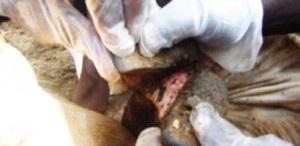 Government has okeyed cattle feedlots in the Shire Valley to resume slaughter of animals for beef and economic gains two months after suspicions of an outbreak of Foot and Mouth.
Government has okeyed cattle feedlots in the Shire Valley to resume slaughter of animals for beef and economic gains two months after suspicions of an outbreak of Foot and Mouth.
This is largely going to economically benefit the three of the country’s six major cattle feedlots located in the Shire Valley because cattle from the community are still under the ban.
Agriculture minister Professor Peter Mwanza said this when he briefed reporters in Lilongwe on the latest development on Thursday December 1, 2011.
For two months now, beef and dairy products from the Shire Valley were not allowed out of the area because of confirmation of an outbreak of Foot and Mouth Disease.
The disease, which sporadically occurs in the Shire Valley, is trade sensitive with varying socio-economic implications as the valley houses three of Malawi’s major cattle feedlots.
“The ministry would like to assure the public that everything possible is being done to ensure that the disease does not reoccur in the near future,” he said.
Agriculture minister Professor Mwanza told reporters government took this decision after experts confirmed the disease is now under control.
Largely, it is three feedlot owners who will benefit from this move. Some of the feedlot owners are well connected heavy weight politicians. Meanwhile, the ban is still in force for livestock belonging to peasant farmers in the communal hood.
“Cattle from the feedlots which are ready for slaughter shall with immediate effect be allowed to be slaughtered under the supervision of veterinary staff at the designated approved slaughter abattoirs only,” he said.
Government declares that the ban remains in force for cattle under the communal set-up until after 90 days when it is scientifically expected virus will be completely inactivated.
Agriculture minister Mwanza, however, says the feedlots cannot replace stock from within until a full lift of the ban is declared on ascertaining that the virus is gone. The feedlots, he says, are healthier environments than communal areas.
Meanwhile, the minister has declared resumption of all local slaughters of small stock such as goats, sheep and pigs there.
This, he says, has been done because a recent expert assessment in the Department of Animal Health and Livestock Development shows that there have been no clinical cases detected in cattle within the feedlots and in small stocks such as goats, sheep and pigs.
“…the animals which have been vaccinated are now immuned, however, the virus could still be there within the environment and therefore, the ministry is still intensifying surveillance and monitoring activities in and around Ngabu area to assess the disease situation even after vaccination,” said the minister.
Confirmation of the outbreak was made on 4th October this year in the valley with a total area of 70,000 herds. A total of 33 clinical cases were reported and 51,300 cattle vaccinated.
Government spent close to K10 million un-budget for funds to import vaccines and for other logistical requirements.—Zodiak Online

.jpeg&w=60&q=100&h=60)




.jpeg&w=60&q=100&h=60)





